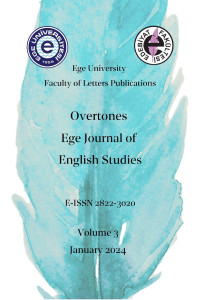Abstract
The myth of eternal return has been a recurring theme in various mythologies of various cultures throughout the world. It has been a way, for the archaic people, to construe the world they live in. The significance of the eternal time that replenishes itself and renews the universe has been a ray of hope for the people who sought after a meaning for their lives and deaths. Instead of a linear, chronological timeline where everything happens once and for all, eternal return calls for the re-enactment and re-actualization of the deeds of gods or mythical beings to incur their spirits to bless, or guide people. Nietzsche’s take on the concept is quite different as he deems this recurrent existence nihilistic and tries to find a way out of this labyrinth. His solution for, as well as his predicament in becoming the Superman is this rhetorical cyclical existence.
Coleridge’s tour de force “The Rime of the Ancient Mariner” embodies the concept of eternal return and the eternal recurrence of the same perfectly. The ancient mariner’s long life and superhuman powers are testaments to his superhuman existence. His repetitive reiteration of his story therefore, is his re-enactment of the same event over and over in an attempt to transcend it in a Zarathustran fashion. The aim of this paper, therefore, is to analyse “The Rime of the Ancient Mariner” in terms of Eliadean and Nietzschean versions of eternal return and to show how by rising above this recurrent and cyclical existence the ancient mariner rises as a Superman.
References
- Bodkin, Maud. Archetypal Patterns in Poetry; Psychological Studies of Imagination. London: Oxford UP, 1963.
- Clarke, George Herbert. “The Symbolism of Sun and Moon in the Rhyme of the Ancient Mariner.” Queen’s Quarterly (1933): 27-45.
- Coleridge, Samuel Taylor. Biographia Literaria. Ed. George Watson. London: J. M. Dent & Sons, 1975.
- ———. Coleridge’s Poetry and Prose. Eds. Nicholas Halmi, Paul Magnuson, and Raimonda Modiano. New York: W.W. Norton, 2004.
- ———. Samuel Taylor Coleridge: The Major Works. Ed. J. Jackson. Oxford: Oxford UP, 2000.
- ———. The Portable Coleridge. Ed. I. A. Richards. New York: Viking, 1950.
- Eliade, Mircea. Myth and Reality. New York: Harper & Row, 1963.
- ———. The Myth of the Eternal Return. Princeton: Princeton UP, 2005.
- ———. The Sacred and the Profane. New York: Harcourt Brace Jovanovich, 1959.
- Kroeber, Karl. “‘The Rime of the Ancient Mariner’ as a Stylized Epic.” Transactions of the Wisconsin Academy of Sciences, Arts and Letters XLVI (1957): 179-87.
- Lowes, John Livingston. The Road to Xanadu; a Study in the Ways of the Imagination. Boston: Houghton Mifflin, 1927.
- Löwith, Karl. Nietzsche’s Philosophy of the Eternal Recurrence of the Same. Trans. J. Harvey Lomax. Berkeley: U of California P, 1997.
- Nietzsche, Friedrich Wilhelm. The Anti-Christ, Ecce Homo, Twilight of the Idols, and Other Writings. Eds. Aaron Ridley and Judith Norman. Cambridge: Cambridge UP, 2005.
- ———. The Gay Science. New York: Dover Publications, (1882) 2006.
- ———. The Will to Power. Ed. Anthony M. Ludovici. New York: Dover Publications, (1901) 2019.
- ———. Thus Spake Zarathustra: A Book for All and None. Trans. Thomas Common. New York: Algora Pub., (1883) 2003.
- Untermeyer, Louis. “The Spirit of Revolution and Romance.” in A Concise Treasury of Great Poems, English and American. New York.: Permabooks, 1953. 202-332.
- Wordsworth, William, and Samuel Taylor Coleridge. Lyrical Ballads 2nd Edition. Eds. R. L. Brett and A. R. Jones. London: Routledge, (1798) 1991.
Abstract
References
- Bodkin, Maud. Archetypal Patterns in Poetry; Psychological Studies of Imagination. London: Oxford UP, 1963.
- Clarke, George Herbert. “The Symbolism of Sun and Moon in the Rhyme of the Ancient Mariner.” Queen’s Quarterly (1933): 27-45.
- Coleridge, Samuel Taylor. Biographia Literaria. Ed. George Watson. London: J. M. Dent & Sons, 1975.
- ———. Coleridge’s Poetry and Prose. Eds. Nicholas Halmi, Paul Magnuson, and Raimonda Modiano. New York: W.W. Norton, 2004.
- ———. Samuel Taylor Coleridge: The Major Works. Ed. J. Jackson. Oxford: Oxford UP, 2000.
- ———. The Portable Coleridge. Ed. I. A. Richards. New York: Viking, 1950.
- Eliade, Mircea. Myth and Reality. New York: Harper & Row, 1963.
- ———. The Myth of the Eternal Return. Princeton: Princeton UP, 2005.
- ———. The Sacred and the Profane. New York: Harcourt Brace Jovanovich, 1959.
- Kroeber, Karl. “‘The Rime of the Ancient Mariner’ as a Stylized Epic.” Transactions of the Wisconsin Academy of Sciences, Arts and Letters XLVI (1957): 179-87.
- Lowes, John Livingston. The Road to Xanadu; a Study in the Ways of the Imagination. Boston: Houghton Mifflin, 1927.
- Löwith, Karl. Nietzsche’s Philosophy of the Eternal Recurrence of the Same. Trans. J. Harvey Lomax. Berkeley: U of California P, 1997.
- Nietzsche, Friedrich Wilhelm. The Anti-Christ, Ecce Homo, Twilight of the Idols, and Other Writings. Eds. Aaron Ridley and Judith Norman. Cambridge: Cambridge UP, 2005.
- ———. The Gay Science. New York: Dover Publications, (1882) 2006.
- ———. The Will to Power. Ed. Anthony M. Ludovici. New York: Dover Publications, (1901) 2019.
- ———. Thus Spake Zarathustra: A Book for All and None. Trans. Thomas Common. New York: Algora Pub., (1883) 2003.
- Untermeyer, Louis. “The Spirit of Revolution and Romance.” in A Concise Treasury of Great Poems, English and American. New York.: Permabooks, 1953. 202-332.
- Wordsworth, William, and Samuel Taylor Coleridge. Lyrical Ballads 2nd Edition. Eds. R. L. Brett and A. R. Jones. London: Routledge, (1798) 1991.
Details
| Primary Language | English |
|---|---|
| Subjects | British and Irish Language, Literature and Culture, Romantic Literature |
| Journal Section | Research Articles |
| Authors | |
| Publication Date | January 22, 2024 |
| Submission Date | September 14, 2023 |
| Published in Issue | Year 2024 Issue: 3 |

